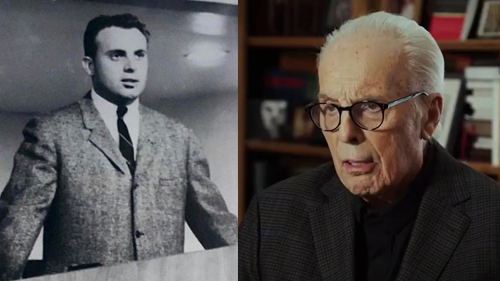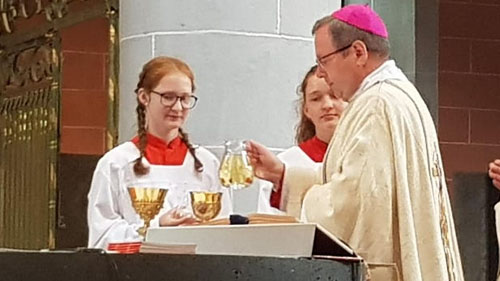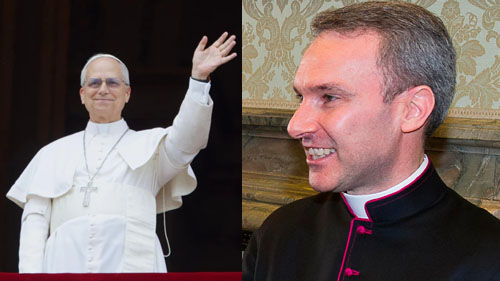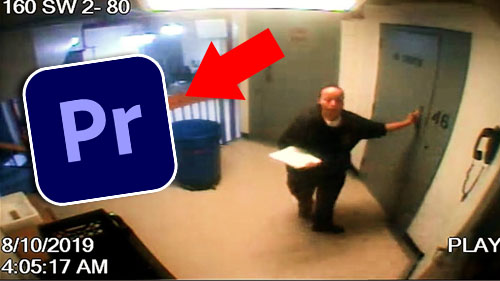| Recent Featured Videos and Articles | Eastern “Orthodoxy” Refuted | How To Avoid Sin | The Antichrist Identified! | What Fake Christians Get Wrong About Ephesians | Why So Many Can't Believe | “Magicians” Prove A Spiritual World Exists | Amazing Evidence For God | News Links |
| Vatican II “Catholic” Church Exposed | Steps To Convert | Outside The Church There Is No Salvation | E-Exchanges | The Holy Rosary | Padre Pio | Traditional Catholic Issues And Groups | Help Save Souls: Donate |  |









 " />
" /> " />
" /> " />
" /> " />
" /> " />
" />




Where to Go to Mass or Confession today? Traditional Options for the Sacraments
Please See This File for the updated Guidelines and Principles on this issue
This is probably the most frequent question that we receive. The answer is somewhat involved because there is hardly a solid Catholic priest to be found in the entire country today. We offer some important guidelines here. Please consult this page carefully. There are few options for Communion today, but more for confession.
1. One must not receive sacraments until one is fully convinced of the traditional Catholic Faith, and of all issues of Catholic Faith covered on this website. (One must also have been baptized, of course.) If you are not yet at that point, consult our section on The Steps to convert to the traditional Catholic faith and for those leaving the New Mass - Baptism and Conditional Baptism - the Council of Trent's Profession of Faith for Converts. Before receiving sacraments, one must reach the point where one is committed never to attend the New Mass again, believes in Outside the Church There is No Salvation without exception (no “baptism of desire,” no salvation for those “invincibly ignorant” of the Catholic faith), rejects Natural Family Planning, won’t support any heretical priests, etc. Moreover, one must believe in the Trinity, the Incarnation, Papal Infallibility, all the traditional dogmas, etc. 2. No Catholic may ever attend the New Mass, since it is an invalid, non-Catholic service, as our material on The Invalid New Mass shows. Attending Mass on Sunday and Holy Days is the Church’s law, which is only obligatory if the Church provides you with an acceptable traditional option within a reasonable distance. Many Catholics in Church history have been in situations where there was nowhere to go to Mass and therefore there was no obligation to go anywhere. So if the only “Mass” you have is the New Mass, then you must stay home on Sundays and there is no sin in doing so. It would be a sin to go to the invalid New Mass. (Further, it should be understood that the priests who were ordained in The New Rite of Ordination [PDF File] were not validly ordained. Since “priests” ordained in the New Rite of Ordination are invalid, any mortal sins confessed to such “priests” must be confessed again to a valid priest once a person is prepared for confession, as explained in this file. The Vatican II sect didn’t change the Eastern Rites of Ordination, however.) Thus, the only option would be to attend a traditional Latin Mass or an Eastern Rite Liturgy, which is offered by a priest who has been traditionally ordained. (We speak of an Eastern Catholic liturgy, not Eastern “Orthodox.” Any church which has “Orthodox” refers to Eastern schismatics and it must be totally avoided). So, then, what about the traditional Latin Masses or the traditional Eastern Catholic liturgies? What about going to confession? There is an option for basically everyone who is convinced of the traditional Catholic Faith to go to confession (see the bottom of this page), but not everyone will have an option for Communion or Mass today. That brings us to our third point. 3. The problem is that almost all of even the “traditionalist” priests who are offering the (correct) forms of traditional Mass also hold to heretical positions. Almost all of the priests who are offering traditional forms of Mass either 1) accept Antipope Benedict XVI as the pope or 2) hold that certain people can be saved outside the Catholic Faith (by “baptism of desire”/”invincible ignorance”). This unfortunately applies to almost every single “traditionalist” priest today. No priest who accepts Benedict XVI as the pope or who believes that souls can be saved without baptism or the Catholic Faith (by “baptism of desire” or “invincible ignorance”) can be supported financially at all, even if that priest is offering a traditional form of Mass. That means that almost every “traditionalist” priest today cannot be supported, since he is holding a position at variance with Catholic teaching. But may one go to such a priest for Communion, if the priest is validly ordained in the traditional rite of ordination and if one doesn’t support him? Yes, one may go some of these “traditionalist” priests if they meet certain conditions. This is explained below. There are a few people today who hold that it’s a mortal sin to receive sacraments from any priest who accepts Benedict XVI as the pope or holds a heretical position. This is wrong. Some of these people are falling into schism on this issue by condemning as heretics or guilty of mortal sin even traditional Catholics who do take advantage of the sacraments which are provided by such priests, even with all of the stipulations (i.e. when they don’t support the priest and the priest is not notorious or imposing about his heresy). That schismatic view, that it’s heretical and always mortally sinful to go to any of these priests, is discussed and refuted in this file:
The Question of whether one may receive Sacraments in these difficult times
*refuting schismatic views in this area; updated on occasion when new points come up; note will be posted in E-Exchanges when it’s updated*
Audio discussion about the "una cum" issue, where one may receive sacraments, refuting radical schismatic views [44 min. audio] - File of relevant quotes
Is it ever permissible to go to a validly ordained priest for the sacraments who claims to be Catholic but prays in union with Benedict XVI or holds to some other heresy?
This article is for those who are concerned about this particular issue. We have provided the strictly theological arguments and the backing for our position on this matter in our other files. However, this article examines the issue from a different angle. It provides a common sense approach to the issue, and sheds more light on the question by focusing on things which many people are forgetting.
"Sacraments from Undeclared Heretics" Debate - Article and Audio [new article and debate]
Quotes on the Benefits and Importance of Holy Communion
4. The “traditionalist” priest whom a Catholic can approach for Communion today must be validly ordained and cannot be notorious or imposing about his heretical position and you cannot support him. He cannot condemn you for holding the sedevacantist position or for rejecting “baptism of desire.” And he cannot be a “notorious” heretic. For example, with regard to a priest in the Eastern Rite who accepts Antipope Benedict XVI as the pope, here are some guidelines: you must call the Eastern Rite priest up and ask him certain questions before receiving Communion from him. You should confirm that he was ordained in the Eastern Rite and ask him what he thinks of praying with members of other religions, “ecumenism,” etc. If he’s not opposed to it, but is in favor of the Vatican II ecumenism, then he is a notorious heretic and you should not receive Communion from him. Another question to ask him is whether he believes that non-Catholics, such as the “Orthodox,” need to be converted to the Catholic Faith. If he doesn’t say “yes,” then he is a notorious heretic. But if he answers in a more conservative way, then you could go to him for Communion without supporting him. But when you go to such a Mass in order to receive Communion, we recommend that you simply pray by yourself. It should also be noted that some of the Eastern Rite liturgies have been revised and modernized. For example, liturgies in the Ruthenian jurisdiction of the United States have been revised and thus are not an option for Mass or for Communion. They should not be attended, but other priests of the Eastern Rite (such as Ukrainian “Catholic” priests) are an option for confession and for Communion, provided they meet the conditions. But again, one cannot financially support the Byzantine priests at all since they accept Benedict XVI as the pope. 5. Regarding independent “traditionalist” priests who are offering the Latin Mass, almost all of these priests hold that souls can be saved without the Catholic Faith by “baptism of desire” and “invincible ignorance.” We hear all the time from people who say: “my Latin Mass priest doesn’t believe that…” Oh yes he almost certainly does; just ask him the specific questions: Do you believe that souls who are invincibly ignorant of the Catholic faith can be saved? Do you believe in baptism of desire? Do you believe that all who die as Jews, Muslims, Buddhists without exception go to Hell? You will see by his answers that he holds that souls can be saved without the Catholic Faith and the Sacrament of Baptism, which is contrary to Catholic teaching. And if he imposes his false view of salvation on you, or imposes his acceptance of Benedict XVI on you – in other words, if he thinks you’re in heresy or mortal sin for your beliefs – then you should not go to him for Communion or Mass at all. Some of the specific groups and priests which must be totally avoided are mentioned below and in the “Beware” section of our website. Many of the independent Latin Mass priests are off-limits because they are imposing about their false positions. But with some other “traditionalist” priests, you can go to them for confession and Communion if they are validly ordained and not notorious or imposing about their false positions and if one doesn’t support them. One must ask the priest certain questions and consult the file above more specific guidelines. But there is no obligation to attend the Mass of a heretic or the Mass of a priest holding a heretical position. Thus, there is no obligation to attend the traditional Mass of a validly ordained “traditionalist” priest who accepts Benedict XVI as the pope, or who believes in baptism of desire/salvation for non-Catholics (as almost all so-called traditionalists priests do), since he is holding a heretical position. That would include almost all of them. If one doesn’t feel that he should attend such a chapel, he doesn’t have to. But may one ever go? Yes, as explained in the file above. Here are a few facts which show that one may receive sacraments from some of these priests.
Cardinal de Lugo, who was a prominent theologian of the 17th century, who was often quoted by St. Alphonsus, also addresses this issue about receiving sacraments from a priest who holds a heretical position:
Notice that Cardinal de Lugo distinguishes between attending a heretical rite (which is never permitted) and attending a Catholic Mass or rite celebrated by an undeclared heretic (e.g. a priest of the SSPX who celebrates the Catholic rite and claims to be Catholic but is actually a heretic). De Lugo is thus addressing the very issue which is confronting people today and which was posed in the question. And what does he say? He teaches that attendance at such a Mass is lawful and that this is the “general and true” position of Catholic theologians. Please note that Cardinal de Lugo also points out that if circumstances are such that scandal or a denial of the Faith would necessarily arise (e.g., if the priest made an announcement that everyone who attends must agree with him, such as the priests of the SSPV have on the salvation issue), then you necessarily couldn’t go; or if the priest is notorious about his heresy, then you definitely shouldn’t go. But that is not the case at all Masses celebrated by undeclared heretical priests in the Catholic rite; otherwise de Lugo would have stated that the teaching of all theologians is that all such Masses must always be avoided. A Catholic can never support such a priest and thereby assist him in the propagation of heresy, but he could attend his Mass in order to receive the Sacrament if the priest professes to be Catholic and is not notorious about his heresy. But if the priest agrees with, for instance, what is printed on the SSPX’s website one should not attend his Mass:
So, to summarize: Don’t ever attend the invalid New Mass, of course. Don’t attend any Society of St. Pius V chapel, because they impose upon the people their heretical belief that people can be saved without the Catholic Faith. Don’t attend any Society of St. Pius X chapel if the priest believes that sedevacantists are heretics or has made an announcement stating that he doesn’t want sedevacantists or “Feeneyites” at the chapel. This will probably mean that most SSPX priests are off-limits, but there may be a few who aren’t notorious or imposing about their heresy. If so, you may be able to attend without supporting the chapel. Don’t attend any Indult Mass. Don’t attend the Mass of a Byzantine priest or independent priest who is notorious or imposing about his acceptance of the Vatican II religion. And never attend the Novus Ordo (the New Mass), of course. If you find a priest who is validly ordained, who is not notorious or imposing about his heresy – for instance, a Byzantine priest or an independent “traditionalist” priest who believes that Benedict XVI is the Pope – then you could receive the sacraments from him (although you don’t have to) AS LONG AS YOU DON’T SUPPORT HIM FINANCIALLY IN ANY WAY. DON’T SUPPORT ANY PRIEST OR GROUP WHICH ACCEPTS BENEDICT XVI AS THE POPE OR WHICH BELIEVES IN BAPTISM OF DESIRE; otherwise you will be assisting in the propagation of heresy and funding heretics.
These are just some brief guidelines on this difficult issue of where to go to Mass. This is a fluid situation, since priests change their positions and groups become more notorious over time. For instance, while people used to be able to attend the SSPV without supporting them (since they hold heresy), that is not an option any longer because they made announcements imposing their heretical view upon people from all their pulpits in 2004.
If a person has committed mortal sin and needs to go to Confession, he can go to a Novus Ordo priest who was ordained in the Traditional Rite of Ordination (before 1968) as long as the priest says “I absolve you from your sins in the name of the Father and of the Son and of the Holy Ghost.” This can be done if a person needs to go to Confession.
Also, if people are fully convinced on all the issues of Catholic faith which are covered on our website, then they can call us at the monastery and we can direct them to possible Mass locations in their area.
Sign up for our free e-mail list to see future vaticancatholic.com videos and articles.
Recent Content
^